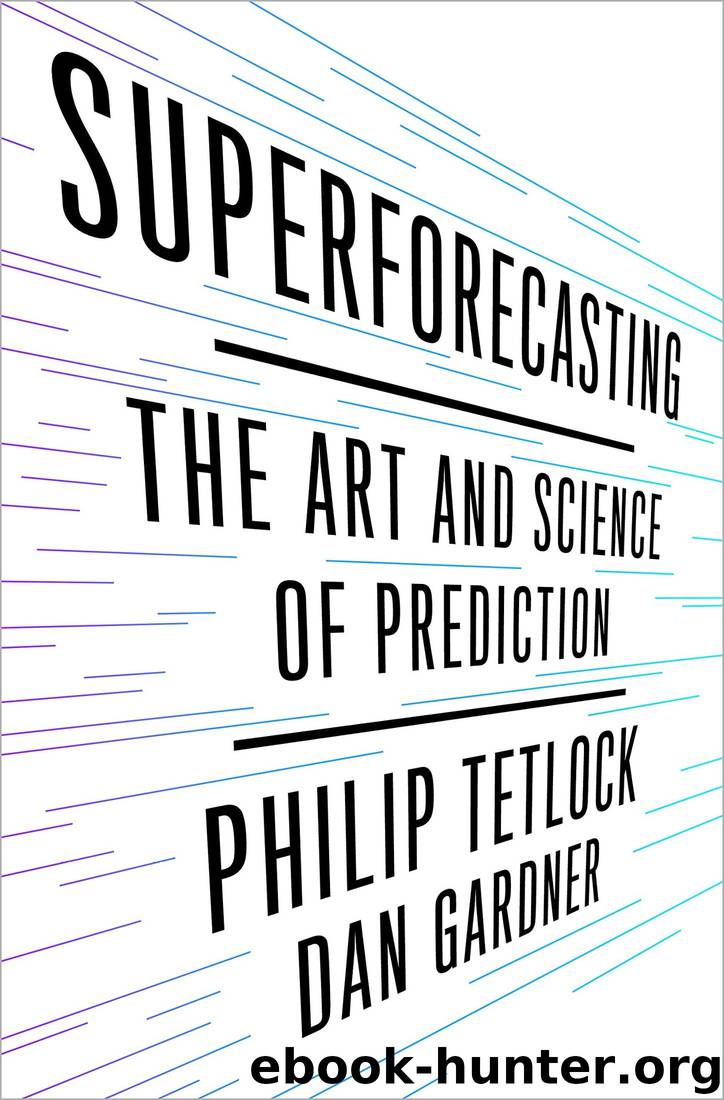Superforecasting: The Art and Science of Prediction by Philip E. Tetlock & Dan Gardner

Author:Philip E. Tetlock & Dan Gardner [Tetlock, Philip E. & Gardner, Dan]
Language: eng
Format: epub, azw3
Tags: Business & Money, Management & Leadership, Planning & Forecasting, Medical Books, Psychology, Cognitive, Politics & Social Sciences, Social Sciences, Science & Math, Behavioral Sciences, Cognitive Psychology, Technology
ISBN: 9780804136693
Amazon: B00RKO6MS8
Publisher: Crown
Published: 2015-09-29T04:00:00+00:00
Over
Imagine you are a subject in an odd undergraduate psychology experiment. The researcher asks you to read a bit of information about someone. “Robert is a student,” it says. “He studies about thirty-one hours each week.” You are then asked to predict Robert’s grade point average. It’s not much to go on, but it matches your stereotype of a good student. So you guess his GPA is pretty high.
Now try this one: David is a psychotherapy patient who is sexually aroused by violent sadomasochistic fantasies. Question: How likely is David to be a child abuser? Again, you have little information, but what you have fits your stereotype of child abusers. So you say there is a good chance he’s one.
Now suppose I gave you more facts about Robert. What if I told you he plays tennis three or four times a month? And the longest relationship he has had lasted two months? Would you change your estimate of Robert’s GPA?
And here’s more information about David: He likes to tell jokes. He once injured his back while skiing. Now, is he more or less likely to be a child abuser?
You may be thinking, “All that additional information is irrelevant. I’d ignore it.” And good for you. It was carefully preselected for its total irrelevance.
And yet, irrelevant information of this sort does sway us. In 1989, building on work by the psychologist Richard Nisbett, I ran a study in which randomly selected participants got either the bare minimum facts or that information plus the irrelevant facts and then estimated Robert’s GPA or David’s proclivity for child abuse. As expected, those who got the irrelevant information lost confidence. Why? With nothing to go on but evidence that fits their stereotype of a good student or a child abuser, the signal feels strong and clear—and our judgment reflects that. But add irrelevant information and we can’t help but see Robert or David more as a person than a stereotype, which weakens the fit.10
Psychologists call this the dilution effect, and given that stereotypes are themselves a source of bias we might say that diluting them is all to the good. Yes and no. Yes, it is possible to fight fire with fire, and bias with bias, but the dilution effect remains a bias. Remember what’s going on here. People base their estimate on what they think is a useful tidbit of information. Then they encounter clearly irrelevant information—meaningless noise—which they indisputably should ignore. But they don’t. They sway in the wind, at the mercy of the next random gust of irrelevant information.
Such swaying is overreaction, a common and costly mistake. Look at a typical day in the stock market. The volume and volatility of trading are staggering. The reasons for that are complex and the subject of much research and debate, but it seems clear that at least some of it is due to traders overreacting to new information.11 Even John Maynard Keynes—he may not have said those famous words but he really did urge
Download
Superforecasting: The Art and Science of Prediction by Philip E. Tetlock & Dan Gardner.azw3
This site does not store any files on its server. We only index and link to content provided by other sites. Please contact the content providers to delete copyright contents if any and email us, we'll remove relevant links or contents immediately.
Hit Refresh by Satya Nadella(9122)
The Compound Effect by Darren Hardy(8941)
Change Your Questions, Change Your Life by Marilee Adams(7756)
Nudge - Improving Decisions about Health, Wealth, and Happiness by Thaler Sunstein(7689)
The Black Swan by Nassim Nicholas Taleb(7105)
Deep Work by Cal Newport(7063)
Rich Dad Poor Dad by Robert T. Kiyosaki(6603)
Daring Greatly by Brene Brown(6501)
Principles: Life and Work by Ray Dalio(6415)
Playing to Win_ How Strategy Really Works by A.G. Lafley & Roger L. Martin(6226)
Man-made Catastrophes and Risk Information Concealment by Dmitry Chernov & Didier Sornette(6002)
Big Magic: Creative Living Beyond Fear by Elizabeth Gilbert(5754)
Digital Minimalism by Cal Newport;(5747)
The Myth of the Strong Leader by Archie Brown(5496)
The Slight Edge by Jeff Olson(5410)
Discipline Equals Freedom by Jocko Willink(5378)
The Motivation Myth by Jeff Haden(5203)
The Laws of Human Nature by Robert Greene(5171)
Stone's Rules by Roger Stone(5080)
